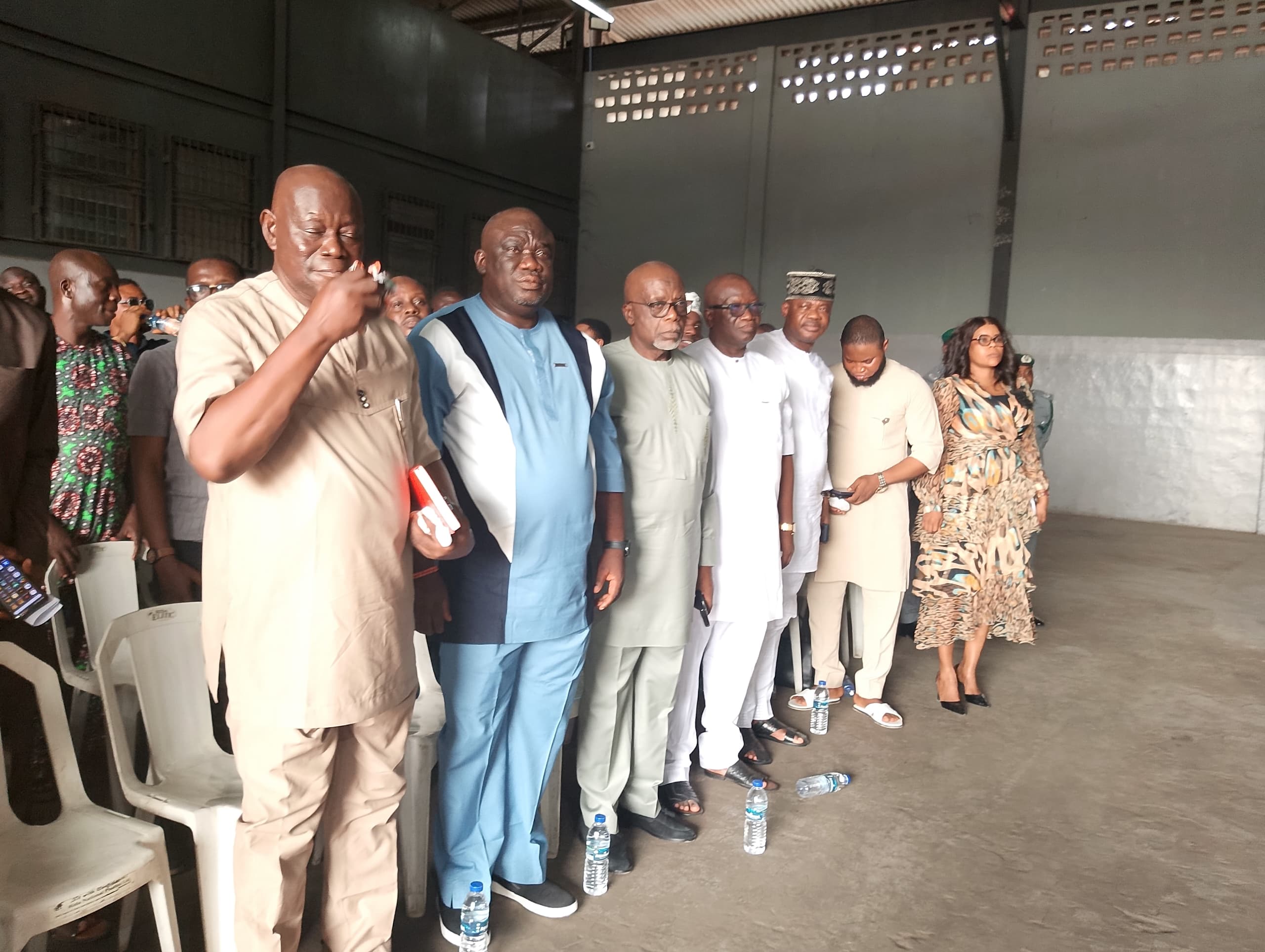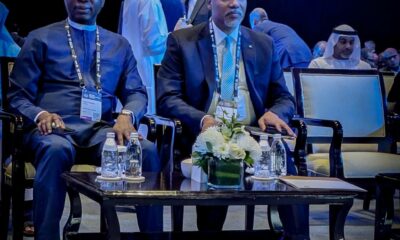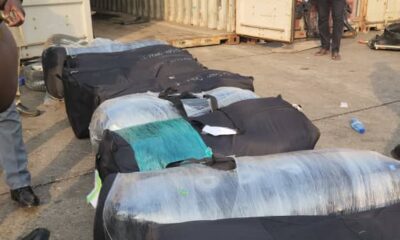Features
Exporters Insists NXP/TTP Integration Inhibiting Trade Flow

BY FUNMI ALUKO
Nigerian exporters under the auspices of the Association of West African Exporters and Maritime Professionals (AWAEMAP) yesterday, Thursday, February 20, 2025 asked the Federal Ministry of Finance (FMF) and the Central Bank of Nigeria (CBN) to resolve the newly introduced Nigeria Export Proceed (NXP) policy, noting that it’s integration with the Truck Transit Park (TTP) is inimical to trade facilitation; even as the group claimed that its implementation has reduced export trade by over 40 percent.
President of AWAEMAP, Hon. Olumekun Olubunmi speaking on the sideline of a stakeholders’ meeting called by the Lily Pond Export Terminal Command of the Nigeria Customs Service, said government officials lack the knowledge of how to successfully deploy the new policy in a real time, online manner, resulting unprecedented delays in the documentation of export containers and seamless entry into the port.
“You already heard about the delay we are going to through in the form of this process that was just introduced by Nigeria Port Authority that is supposed to promote trade. It is now in the reverse, it is not promoting trade.
“The process is now slow, so that is why we are here, any process that is not fast tracking trade is not going to be allowed. They just introduce a policy, they don’t know how to make it work, I am trading by tonnage weight, not by size according to international trading standard.
“They introduced NXP as a means of document declaration documents, which involves the tonnage, then the size of the good, and the quantity of the goods you are exporting. But now the policy…NPA is now saying that every container has to be carry the NXP number which was not there at the beginning of the process.
“The process is taking more than ten days, we are losing our goods and money and we are saying government should return to the Single Window, we have to go back to the old one and let the business flow the way it has been flowing before on the single window.”
According to Olubunmi, the crisis has been on for about two weeks.
“You can see the number of containers outside waiting for them to get into the port. We have been using the Single for over 15years before the NXP was introduced. Before, you don’t need to have the container assigned number before you go in, the NXP is online. Like in import, you don’t need to show the goods to get your Form M, you get your Form M with your LC only. But the NXP is the opposite now, it is causing big delay. The Pre-shipment Inspection Agent (PIA) people will download your container after stuffing and will be treating them bit by bit. Out of maybe 100 or 200 containers, they treat maybe two container; and it is after stuffing, after completion of the job that you now send your packing list and your invoice.
“ Listing the container number they will now download that container number while we are going to wait for that container to be stuffed before we take them to the port after downloading, which is going to take days. So if you are stuffing 10 containers every day, for you to meet up 100 containers that is about 10 days. So is it after 10 days that container will start moving to the port and by that time the vessel have come and gone.”
He said whereas trade is better facilitated under the Single Window arrangement, the introduction of too many hands in the trade facilitation chain is causing issues and will not promote export trade.
“We should allow the custom to do their job, let them facilitate trade because as a custom agent we have the right to be in the port to do our business, I mean we have approval for 72 hours before we can get our document.”
He lamented that despite a number of correspondences with the NPA on the challenge, nothing has been done, saying the impact on business is very disturbing.
“It is a very bad signal to the economy bcause a lot of things is going to be affected by the time the export items get there they may already be spoilt. So you know what the implications is, we trade in millions of naira with bank money. It i not the exporter’s money, it is Nigeria money, insurance is also involved, everybody is involved. The risk of it and the damage it is going to cause to Nigeria image when the goods get there already spoilt is huge.
“Remember that Americans and Europeans have been saying that Nigerian goods are not up to standard, these unnecessary delays are part of the problems. Lots of people are now shipping from Ghana, and taking Nigeria beans from Ghana to London, taking Nigeria yam from here to Ghana and shipping them to London.”
Stakeholders had at the meeting revealed that the integration of the NXP into the Truck Transit Park (TTP) by NPA designed to streamline export processes has instead resulted big bottle necks and delays, creating confusion and financial setbacks for exporters.
The stakeholders complained particularly about the challenge of securing NXP Number to containers arising from procedural and operational delays, noting that the federal government should seek expertise on how best marry the processes and procedures leading to the generation of NXP Numbers for export containers.
Participants in the meeting agreed that their request for urgent intervention is not only for their own benefit but also serves the interests of the nation as a whole, since perishable goods that suffered undue delays associated with the NXP Policy will double down the image of the country in the world market.
They stressed the importance of finding a solution that accommodates all parties involved. The Customs Area Controller of the Lilypond Export Command, Comptroller H. R Odusanya said the Nigeria Customs Service is always available to jaw jaw with the NPA and others to find a solution around the challenge.
“This emergency meeting is because the NXP policy being operated by the Nigerian Port Authority through the TTP and the Export Processing Terminals for the movement of export cargoes into the port.
He said, “We customs are here because our motive is to make sure that our distinguished stakeholders are happy with whatever is being deployed that affects their goods. It is when our stakeholders are happy that we are also happy”, he said.
The NPA representative on his part said NPA’s task is simply to implement and is therefore not in any position to consider a review; even as he complained that invitation to the stakeholders meeting came late.
“It was just about a couple of hours ago that I was informed about this emergency meeting. the AGM herself would have been here, but she’s, not around presently, that’s why I have to come. The little I can say about this issue is that, one, NXP is not NPA policy, it’s a federal government policy, which the Customs is very much aware of. And movement of exports to the port…I remember that a couple of weeks ago, members of AWAEMAP were in Marina on this issue.

“The agreement reached then with them was that since it’s a policy by the federal government driven by PEBEC and NPA, that AWAEMAP or exporters need to go back to PEBEC for whatever observations they have. NPA cannot on its own, say, drop NXP. So, that is, I believe, where the issue is.
“Then, a couple of days ago, the issue came up again about, some containers not having access to go to the port because of NXP or whatever. And it was then resolved that TTP should liaise with CBN and with Customs to fine-tune the process. And that’s when, I believe, some containers got on the course.
”What I discovered was that some of the containers that came don’t have NXP…that is the issue…and it’s like, we are saying that, maybe, NXP should not be, we should not follow the rule of NXP for such containers to go.
”So, I think that’s the situation. And like I said, NPA cannot on its own, drop NXP. No, it’s a federal government policy, so that’s what it is.”
Unable to hide his disapproval however, member of the Board of Trustees of AWAEMAP, Alhaji Nofiu, said they are not asking the NPA to abandon the NXP contrary to the argument advanced by the representative of the Authority AGM Operations, Mrs. Oladimo.
“We are urging the NPA to take action to resolve the crisis, given that they are responsible for its implementation. We know that NPA alone can discuss the problem with the Presidential Enabling Business Environment Council (PEBEC).”
He proceeded to undertake a comprehensive overview of the conflicts associated with the NXP, while seeking the to have properly displayed, whatever missing link the NXP may be suffering from.
“But we need to understand the procedure and follow the procedure. The custom has a procedure in facilitating trade, which they have been following when this particular issue was introduced, the CBN stipulate every function of this particular NXP. The finance control policy on exports, if anything has to come up with any amendment; it has to come through the finance ministry, central bank and customs.
“In a situation when the NPA…we understand they are more concerned about transports, not commerce, not trade, and we are talking of trade today, we are not talking of transportation. We don’t want a situation where there will be struggle for the transport oversight function of trade. This is what we want to correct, the introduction of this NXP. When this thing was introduced, the first CBN manager I met I asked a question, the NXP, what are the functions? The forwarder also needs to come in and the CBN told me that the NXP is what Form M is to imports.
“To our own surprise today, the PEBEC we understand are concerned about ease of doing business in the port but what we are seeing today is the reverse because first of all, we need to understand the system. Let us first of understand when you open your NXP, what is only made a available to the shipper and agent is just a photocopy which we work on and liaise with PIA; with this certain information need to be filled online not even physical, anymore. As soon as this is completed it will trigger whatever the warehouse makes available before the arrival of PIA and the custom of or any other person that has anything to do with that part of documentation.”
Providing further insights into the conflicts, Alhaji Nofiu said: “And to imagine that the last container must be stuffed before the PIA can write their report, not only that after the completion of the stuffing, the shipper the exporter need to send the packet list to PIA for them to complete their report. They need to upload this on the portal, which indicates that the NXP is ready for payments. The area the NPA is now requiring us that before the container can get into the port the CCI must be ready is a wrong approach.
“Everybody was there to witness this particular stuffing and the stuffing has been completed. Custom would not allow release before the insurance of CCI, why this if all party were satisfied with the examination conducted.
“There is no way any container can be shipped without insurance of CCI, what we are concerned about is that as long as the Custom are satisfy and other agencies are satisfied, allow our containers to access the port.
Nobody want to close NXP, everybody knows it is important, but let us understand the system, how it work, so it does not affect trade. This is what we are appealing to Nigeria Port Authority. Tell PEBEC that the system will not help our export, NPA should please know that we are not trying to go against the policy, we just need to all sit down and understand the system cause if we do not understand the system there will always be a clash”, he declared.
Contributing, Coordinator of the Western Zone and representative of the NEPC DG said he believe that the NPA is the right bridge between exporters and the federal government, while calling for more engagement and possible review of the policy framework.
“I want to appeal to NPA, because when we talk about export, it is very, very germane to Nigerian of today. We don’t have to delay anything that concerns export promotion. It’s affecting the economy. We can’t be import dependent; it will not work for us as a nation. These exporters want to export their goods outside, and they cannot do so because of one policy or the other.
“And this policy is something that all stakeholders has to be carried along because it affects all of us. I feel that NPA can solve this issue. It will not be well for these exporters to lose their money, some of the goods are perishable. Before you know it, they are lost and we are discouraging export. I’m only appealing that NPA should have a meeting with the PEBEP.
“It affects our KPI, it affects Custom KPI, we are all agencies. What affects one agency affects other agencies. There’s a new policy, a new KPI now that each agency will be rated. So if we are trying to stop these people from exporting their goods, it affects custom. NPA is involved. We are now disadvantaged because of this issue.”
Reacting however, NPA Traffic Manager who was also represented protested vehemently, noting that NPA is committed to trade facilitation; even as he suggested for yet another meeting.
“We in NPA are pro trade, we are trade facilitators and bringing all the EPTs is to make exports easier in Nigeria because we want Nigeria to be a major exporter and to be less of import driven economy. That’s why we have the EPTs and part of what we want the EPTs to do is to make sure that we have checks.”
“I want to make a suggestion that it is better we have another meeting between NPA, the export representative and customs, real meeting, not the one that we will be sending representative to go and attend and at the end of the day will not get to the bottom of the issue.
“Part of the way we try to find solution to the problem was when they said that initially Custom should handle all these things, that containers are hanging. But we had reports that it was not going as expected, that was why we asked TTP to liaise with EPTs and that’s why we said… quoting you, we ask 65% of the containers or thereabout.
“So I think we still need to work on what we’re doing, it should be a work in progress. When we have a new policy we are expected to have these same problems. So it is for us to now work together seriously this time around, not ‘touch and go’, but seriously to make sure that we find a solution to this and stop giving the impression that NPA is anti trade. No we are not , please”, he protested anew.
































